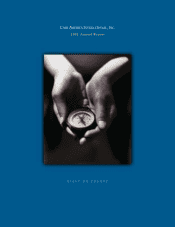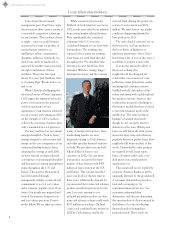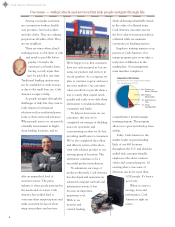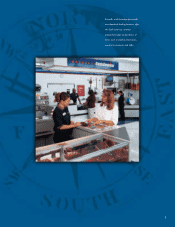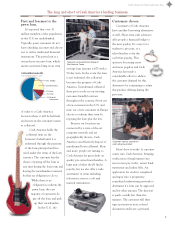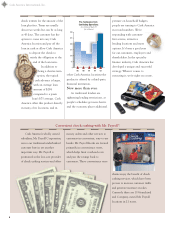Cash America 2002 Annual Report Download - page 4
Download and view the complete annual report
Please find page 4 of the 2002 Cash America annual report below. You can navigate through the pages in the report by either clicking on the pages listed below, or by using the keyword search tool below to find specific information within the annual report.
2
I once heard the renowned
management guru, Tom Peters, argue
that execution alone cannot survive as
a sustainable competitive advantage
for any business. The academic theory
is simple…since successful business
execution by a team is a product of
certain human attributes, i.e.
intelligence, talent, commitment,
discipline, influence, teamwork, etc.,
then it can surely be duplicated or
surpassed by another team possessing
the right combination of those
attributes. This is the faster gun
theory. For every Jack Nicklaus, there
is a looming Tiger Woods, and so on
and so on.
While I hesitate challenging the
theoretical merits of Peters’ argument,
I will suggest the argument belies the
power of execution in the practical
world of operating a service
organization. Cash America achieved
record revenues and earnings in 2002
on the strength of 3,000 coworkers
collectively executing a business plan
with a remarkable level of precision.
You may recall my last two annual
messages heralded a “back to basics”
strategy designed to refocus time and
energy on the core competency of our
traditional lending business. Since
adopting this strategy in early 2000,
we have enjoyed an unprecedented
convergence of operating philosophies
and best practices among management
teams throughout the U.S. and
Europe. This positive phenomenon
has been fostered through
management stability, teamwork and
commitment to a set of core values
and a common, popular vision of our
future. Our people are energized and
excited. Excitement sharpens focus
and focus drives precision. Positive
results follow. We are right on course.
While execution has been the
lifeblood of Cash America’s success in
2002, results were aided by an infusion
from certain market-related elements.
Most significantly, the continued
softening of the U.S. economy
accelerated demand for our short-term
loan products. The working-class
citizens in this country are working
fewer hours per week than they did
throughout the ’90s, and their time
between jobs after layoffs has been
extended. With less savings, longer
interruptions in pay, and the constant
reality of unexpected expenses, these
hardworking families are more
frequently turning to Cash America
and other specialty finance businesses
for help. We provided over one-half
billion dollars of loans to our
customers in 2002. Our core pawn
loan product accounted for three-
quarters of that business with $408
million of loans written in the U.S.
and Europe. This volume exceeded
prior year levels for the first time in
three years. Additionally, demand for
our unsecured short-term cash advance
product exceeded expectations for the
year. Last year’s message to you
included my prediction that our short-
term cash advance volume could reach
$100 million in our shops. On final
count, total combined loans written in
2002 by Cash America and by the
national bank offering the product in
certain of our locations was $124
million. We don’t foresee any market
conditions dampening demand for
loan products in 2003.
The only cloud of concern I see on
the horizon for our loan products is
the loose threat of legislative or
regulatory interference. Since I have
heard from a few of you on this topic, I
would like to explore it more fully.
It seems the practical realities of
life in our working-class
neighborhoods has disrupted the
comfortable consciousness of some
politicians, career bureaucrats, media
and misguided consumer activists.
Saddled with the discomfort of this
reality and armed with a philosophical
bias against corporate America, this
coalition has mounted a challenge to
the business models that have evolved
to meet the financial needs of the
middle class. The term “predatory
lending” is bandied about freely
though no one can quite muster a
definition of the term. While pawn
loans are well below the radar screen,
unsecured short-term cash advances,
popularly known as payday loans, have
caught the full brunt and fury of the
attack. Unmistakably, other products
are targeted as well: home equity
loans, sub-prime credit cards, over-
draft protection, rental purchase
transactions, etc.
This assault will not be repelled by
corporate America. Rather, it will be
summarily defeated by the groundswell
of consumer demand that provides a
loud and convincing cry for
convenient financial services. Our
customers understand their
alternatives, and they are demanding
the same freedom of choice enjoyed by
the balance of society in selecting
financial products fitting their
particular needs. These needs are
To my fellow shareholders:
Cash America International, Inc.

